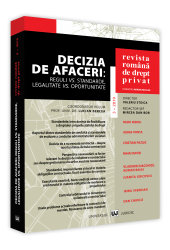Executarea coactivă, buna-credinţă versus culpa creditorului în materia obligaţiei de moderare a prejudiciului
Co-active performance, good faith versus creditor’s fault in the matter of the obligation of moderating the damage
Author(s): Juanita GoicoviciSubject(s): Law, Constitution, Jurisprudence, Civil Law
Published by: Universul Juridic
Keywords: good faith; culpable behavior; duty to mitigate; under-compensatory damages; shared liability; co-active performance;
Summary/Abstract: Having its conceptual roots in the common law mechanism of the duty to mitigate the damages, article 1.534 of the Romanian New Civil Code mentions that, in the hypotheses in which a contractual promise to perform is broken by the contractual debtor and contractual loss is subsequently caused to the creditor, the responsibility for the specific loss is shared by the debtor as promisor and the contractual creditor in three types of situations. Firstly, one should nominate the cases in which the creditor culpably fails to take certain reasonable or available measures or fails to initiate a reasonable course of action that would have secured the diminution of the patrimonial loss generated by the debtor’s inaction. Secondly, in the cases in which the contractual creditor does successfully take action to moderate the damages pending upon the debtor’s failure to perform, but there should have been a costlier and more reasonable available/alternative course of action that the acting creditor could have been taken in order to secure the non-multiplication of the patrimonial losses. Third and final category of situations, when the creditor does successfully take action to bring about the promised contractual performance close to the one described in the contractual documents, but the costs of that particular action exceeds the loss that would have occurred had the creditor remain passive (art. 1.534 of the Romanian Civil Code). This study is centered on the problematics of under-compensatory damages rules under the creditor’s duty to moderate the damages and its implications on positive contract law, based on the provisions of article 1.534 of the Romanian Civil Code. The article also deals with precautionary behavior and its reverberations on the concept of culpable behavior, based on the action taken by both the contractual debtor and the creditor (articles 1.510 to 1.515 of the Civil Code). Nevertheless, the reasonableness rule encourages the creditor facing the debtor’s failure to perform, to take optimal and reasonable precautions towards mitigation of patrimonial loss, but it also discourages the creditor from taking unreasonable precautions that would augment the damages generated by the contractual non-performance. To encourage the creditor also to take optimal precautions, the legislator mentions in article 1.534 of the Civil Code that damages recovered by the creditor must be variant with respect to the amount of reliance and, ideally, should be correlated to the culpable behavior of the creditor who, by taking unreasonable action (i) or by not taking reasonable action (ii), has contributed to the patrimonial loss in the context of contractual non-performance. Active performance and co-performance of contractual obligations are two faces of the creditor’s responsible behavior in good-faith, while according to the provisions of article 1.528 of the Civil Code, far from being the sole remedy to the failure of performance of contractual duties, the anticipatory repudiation in bilateral contracts, as a remedy available for the creditor facing the non-performance of reciprocal contractual obligations, is doubled by the creditor’s option to take measures for the co-active performance of the contractual duties in accordance to the provisions of article 1.528 of the Civil Code. The article asserts the argument that, as a concept rooted in Roman law, the creditor’s good faith, in an objective sense, refers to a standard of reasonable behavior which is perceived as a functional criterion for the non-compliance to contractual obligations, counterweighing the rule of partial coverage of contractual damages.
Journal: Revista Română de Drept Privat
- Issue Year: 2019/2019
- Issue No: 03
- Page Range: 183-200
- Page Count: 18
- Language: Romanian
- Content File-PDF

